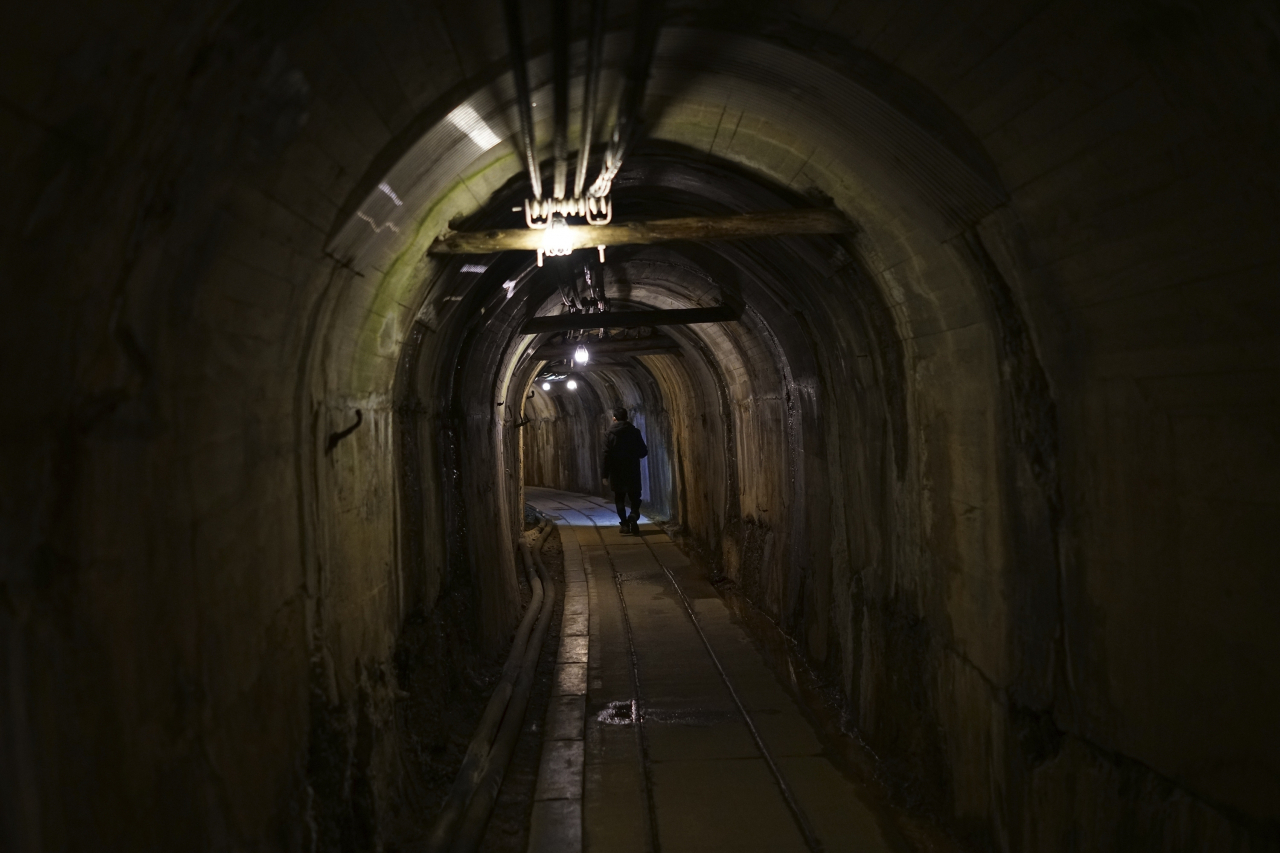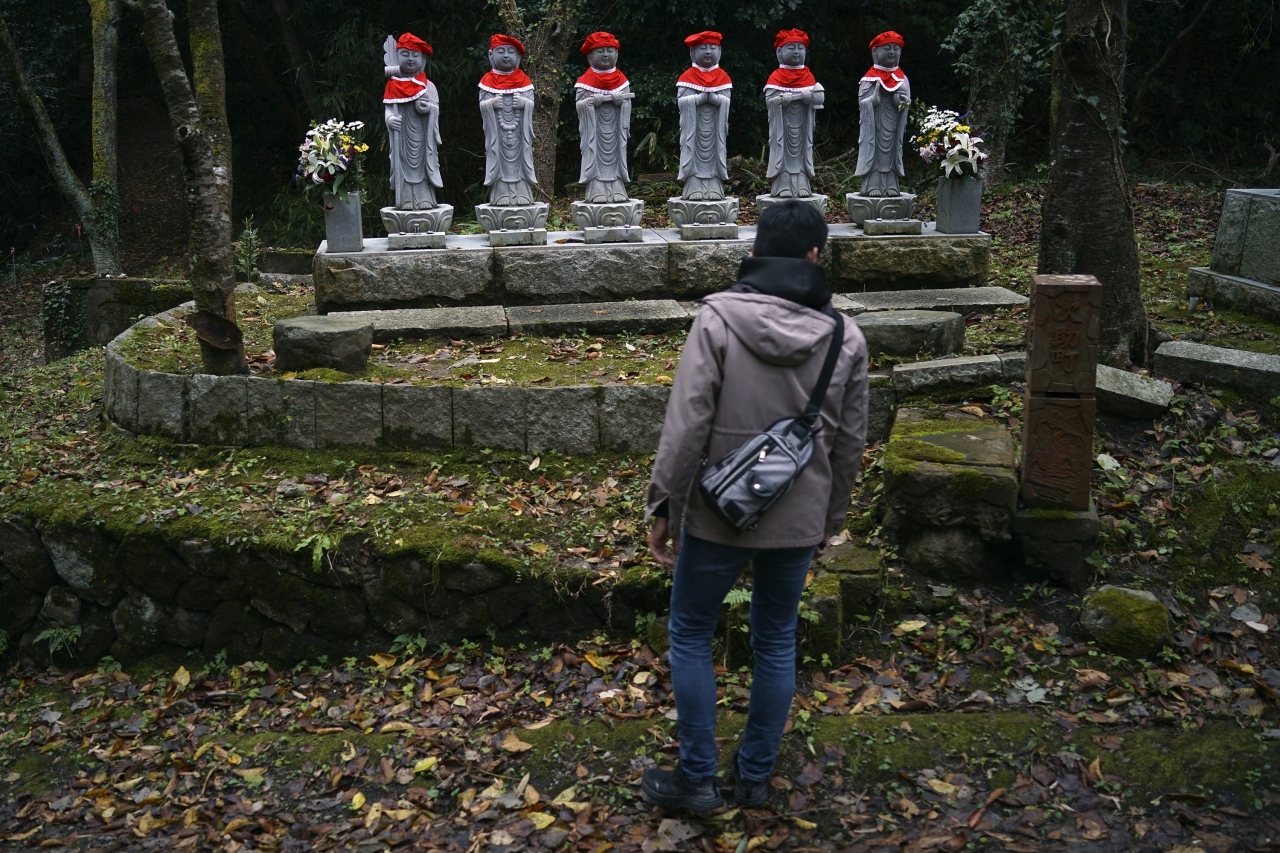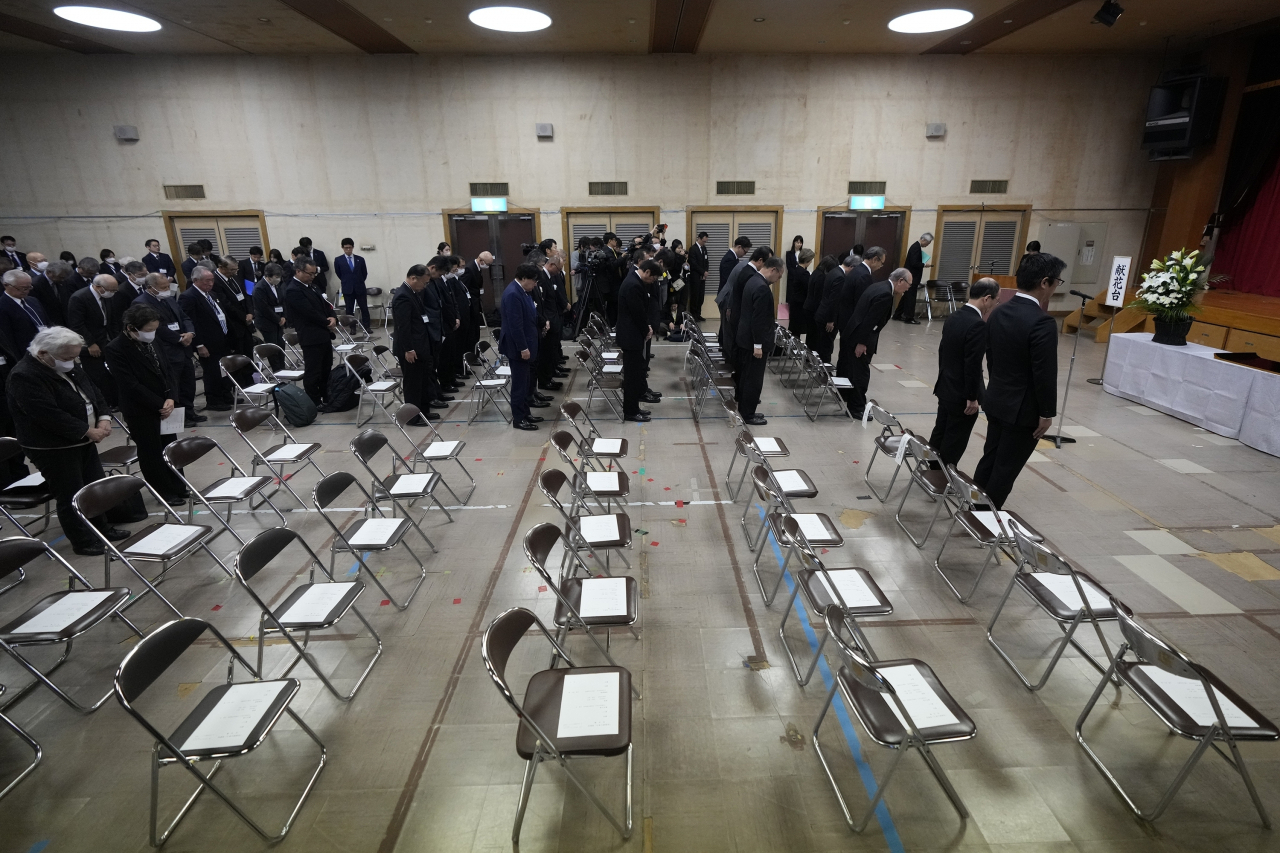 |
A staff walks through a tunnel at Sado Kinzan Gold Mine historic site in Sado, Niigata prefecture, Japan, Sunday. (AP) |
The South Korean government plans to hold a separate on-site memorial ceremony for Koreans forced to work at the gold mines on Sado island during Japan's colonial rule, following a last-minute decision to boycott Japan’s memorial event on Sunday.
Seoul’s abrupt reversal comes amid growing domestic backlash over the choice of Akiko Ikuina, a parliamentary vice minister at Japan’s Foreign Ministry, as the chief government delegate for Sunday’s memorial event. Ikuina has visited the controversial Yasukuni Shrine.
South Korea’s Foreign Ministry announced Sunday that the government would independently host a memorial ceremony at the No. 4 dormitory for Korean workers at the Sado Island Gold Mines at 9 a.m. on Monday, with the attendance of bereaved families of Korean forced labor victims and government officials including the South Korean Ambassador to Japan Park Cheol-hee.
The plan follows the ministry’s statement on Saturday afternoon that the Korean government had decided to forgo attending the "Sado Mine Memorial Ceremony" organized by Japanese authorities at 1 p.m. on Sunday at the Aikawa Kaihatsu Sogo Center in Sado, Niigata prefecture.
“The decision was made because there was insufficient time to reconcile differences between the two countries' diplomatic authorities regarding the memorial ceremony, making it unlikely to reach an agreement acceptable to both sides prior to the event," the Foreign Ministry said in a statement.
Seoul’s last-minute decision to skip the ceremony was primarily driven by Tokyo’s announcement Friday that it would send Ikuina, as the government delegation representative, The Korea Herald learned from diplomatic sources.
According to Japanese media including Kyodo News Agency, Ikuina visited the Yasukuni Shrine on Aug. 15, 2022, the anniversary of Japan’s World War II defeat. The South Korean government has condemned the shrine as a symbol of Japan’s wartime aggression and a site that honors war criminals.
Seoul engaged in monthslong consultations with Japanese authorities to ensure that the Japan-hosted ceremony would honor Korean victims of forced labor during Japan’s colonial rule with a focus on demonstrating genuine sincerity.
The ceremony was pledged by the Japanese government as part of its efforts to secure South Korea’s consent for the inscription of the Sado Island Gold Mines on the UNESCO World Cultural Heritage list, despite the site’s dark history of large-scale exploitation of Korean forced laborers under brutal conditions.
The Japanese delegation pledged to hold an annual “memorial event for all the workers at the Sado Island Gold Mines” during a UNESCO meeting this July, though without explicitly acknowledging Korean workers.
The South Korean government had highlighted the significance of this year’s event, emphasizing that, for the first time, a high-ranking Japanese official would be in attendance -- unlike previous ceremonies organized by civic groups without representation from the Japanese government.
 |
A staff walks through a tunnel at Sado Kinzan Gold Mine historic site in Sado, Niigata prefecture, Japan, Sunday. (AP) |
But Seoul's Foreign Ministry abruptly canceled a scheduled media briefing on the details of the Japan-hosted memorial ceremony just five minutes before its 2 p.m. start on Friday, mainly because of its inability to address the escalating backlash over Ikuina’s participation.
The ministry tacitly admitted to being unaware of Ikuina’s previous visit to the Yasukuni Shrine until South Korean media brought her history to light.
In a message to reporters around 9:10 p.m. on Friday, the ministry defended Japan's decision to dispatch Ikuina, stating that her participation was in response to Seoul's consistent request for a high-ranking Japanese official to attend the memorial ceremony, ensuring its sincerity.
However, Seoul reversed its stance in less than a day, even after the South Korean government delegation and bereaved families had already departed from Seoul to attend Japan’s memorial ceremony.
Seoul also remained relatively subdued in addressing differences with Japan over the details of the memorial ceremony, including the content of Japan's memorial address and the title of the event.
The event is organized by an executive committee consisting of a civic group advocating for the Sado Island Gold Mines’ inclusion on the UNESCO World Cultural Heritage list, Niigata prefectural government and the city of Sado.
 |
Guests offer a moment of silence during a memorial ceremony for the Sado Island Gold Mine in Sado, Niigata prefecture, Japan, as several seats reserved for South Korean guests remained empty Sunday.(AP) |
The Japanese Foreign Ministry expressed regret over Seoul's decision to skip the event in a statement shared with the Japanese Embassy in Seoul on Sunday.
"The Japanese government maintained respectful communication with the South Korean government while collaborating with local officials hosting the event. In this context, it is regrettable that the South Korean side is not participating," the ministry said.
"The government made a comprehensive decision to have Parliamentary Vice-Minister Akiko Ikuina, who is responsible for public relations and culture and Asia-Pacific affairs at the Ministry of Foreign Affairs, attend the ceremony taking into account that the Sado Gold Mines was inscribed as a World Heritage Site this year and that a memorial ceremony is being held," it added.
Japan's Foreign Ministry stated that "Ikuina has not visited the Yasukuni Shrine since taking office as a member of the House of Councillors." However, South Korea's Foreign Ministry disputed this claim on Sunday, confirming that she had visited the shrine on Aug. 15, 2022.
In his interview with local broadcaster MBN, South Korean Foreign Minister Cho Tae-yul on Saturday underscored the importance of "both countries working to ensure that individual issues of singularity do not disrupt the overall flow of bilateral relations," especially in the run-up to the 60th anniversary of diplomatic ties next year.
However, the question of whether Japanese authorities are fulfilling their commitments made in exchange for South Korea's consent to list controversial places as UNESCO World Heritage sites has become an increasingly sensitive issue in South Korea.
Public sensitivity has been further heightened by Japan’s prolonged failure to honor its 2015 promises to South Korea in exchange for the UNESCO inscription of Hashima, widely known as Battleship Island, a site where Koreans were subjected to forced labor.







![[Weekender] Korea's traditional sauce culture gains global recognition](http://res.heraldm.com/phpwas/restmb_idxmake.php?idx=644&simg=/content/image/2024/11/21/20241121050153_0.jpg)